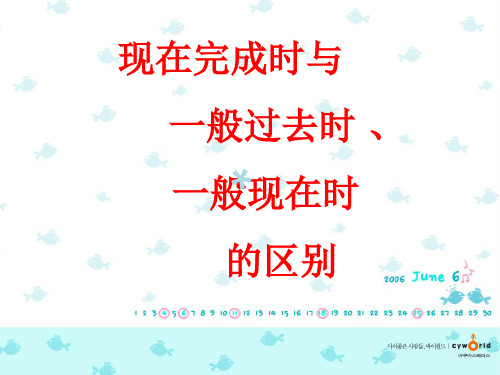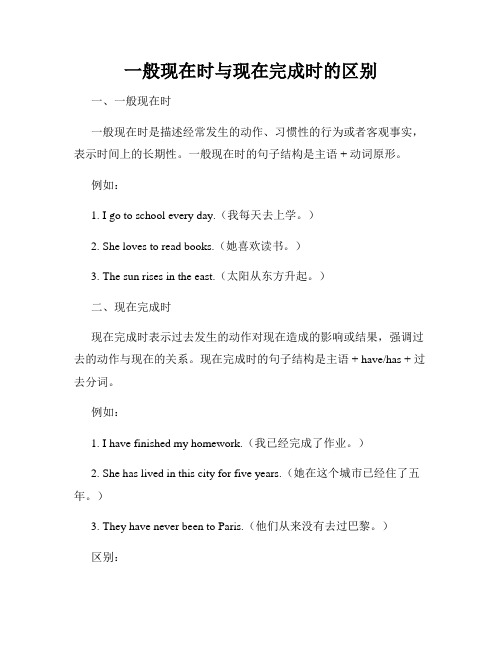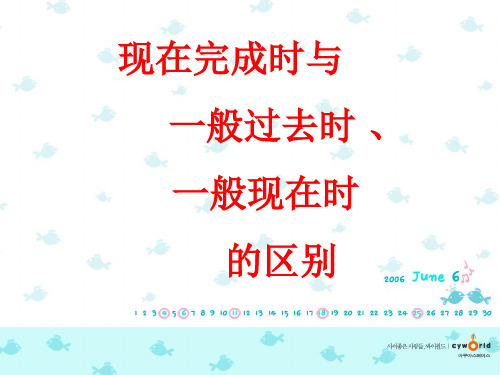一般现在时和现在完成时的区别
一般过去时现在完成时与一般现在时的区别

(二)一般过去时态、现在完成时和 一般现在时的区别
1)现在完成时是表示过去的动作与现在的联 系,主要说明的是现在的情况和状态;而一般 过去时则强调动作发生在过去某一时间,与现 在不发生联系。一般现在时表示经常性,习惯 性的动作或存在的状态.与过去没有关系。 例如:We haven't seen him since last year. 我们自从
He has worked in this factory since 1996.
I have known him since he was a child. 7)so far,in the last / past ……与现在完成时连用。 例如 :
So far,many countries have sent up satellites into space. In the last 30 years, our lives have changed a lot.
He has lived here since he was born. 自他出生 以来一直居住在这儿。(since 自从…以来, 与现在有关,说明他还居住在这儿。)
Liu Mei went to see her grandmother last night . 刘 梅昨晚去看了他外婆。(只说明昨晚)
• 例如:We are good friends(现在情况)
•
我们是好朋友。
• I got to know him in 2005. (过去的动作)
•ቤተ መጻሕፍቲ ባይዱ
我在2005年认识(结识)他
• We have known each other since 2005. (现在完成时把过去的动作和现在联系 起来并着眼于现在)
现在完成时与一般现在时的区别

现在完成时与一般现在时的区别时态在英语语法中起着至关重要的作用,不同的时态表达不同的时间和状态。
两个常见的时态,现在完成时和一般现在时,有着很多共同之处,但也有明显的区别。
本文将介绍现在完成时和一般现在时的区别,以及它们在不同语境下的用法和含义。
一、现在完成时现在完成时表示动作或状态发生在过去某个时间点,但与现在有关。
它通常以"have/has + 过去分词"的形式构成。
下面是现在完成时的几个主要用法:1. 表示过去发生的动作对现在产生的影响。
例如:- I have lost my keys.(我把钥匙弄丢了,现在找不到了。
)- He has finished his work.(他已经完成了工作。
)2. 表示过去开始但仍在进行的动作或状态。
例如:- She has been studying English for three years.(她已经学英语学了三年了。
)- They have lived in the city since 2010.(他们从2010年开始就住在这个城市。
)3. 表示刚刚发生的动作。
例如:- I have just finished my dinner.(我刚刚吃完晚饭。
)- They have recently moved to a new house.(他们最近搬到了新房子。
)二、一般现在时一般现在时表示现在的状态、经常性的动作或普遍真理。
它通常是动词的原形形式,或者加上第三人称单数的" -s "或" -es "后缀。
下面是一般现在时的几个主要用法:1. 表示现在的状态或特征。
例如:- I live in New York.(我住在纽约。
)- He works as a teacher.(他是一名教师。
)2. 表示经常性或习惯性的动作。
例如:- We usually go to the gym on weekends.(我们通常在周末去健身房。
考点区分一般现在时和现在完成时

考点:区分一般现在时与现在完成时中考例题1.She’s brought you some eggs. As you know,she keeps chickens.2.I ate some fruit,which I have enjoyed since i was a child.[一般现在时]1.一般现在时表经常性,习惯性的动作。
He gets up at 7:00 everyday.2.表示客观真理和事实。
The earth travels around the sun.3.描述主语的特征和能力。
she sings very well.[现在完成时]1.过去所发生的动作对现在的影响和所产生的结果。
e.g. we have set up many new factories in this year.2. 表示从过去某个时间段开始延续到现在,并可能延续下去的动作。
e.g. His father has been a school teacher for 29 years.补充1:live,teach,learn,work,study,know均是延续性动词。
They have fallen asleep for an hour.(×)They have been asleep for an hour.(√)Harry has got married for six years.(×)Harry has been married for six years.(√)补充2:since和for引导一段时间在现在完成时中的使用。
①since的用法:A.Since +过去一个时间点(如具体的年,月,日期,终点,1980,last month,half past year)I have been Wuhan since 1980. 从1980年起,我一直在武汉。
B.Since +一段时间+ago.I have been Wuhan since five years ago. 我来武汉已经有五年了。
一般现在时与现在完成时的区别

一般现在时与现在完成时的区别一、一般现在时一般现在时是描述经常发生的动作、习惯性的行为或者客观事实,表示时间上的长期性。
一般现在时的句子结构是主语 + 动词原形。
例如:1. I go to school every day.(我每天去上学。
)2. She loves to read books.(她喜欢读书。
)3. The sun rises in the east.(太阳从东方升起。
)二、现在完成时现在完成时表示过去发生的动作对现在造成的影响或结果,强调过去的动作与现在的关系。
现在完成时的句子结构是主语 + have/has + 过去分词。
例如:1. I have finished my homework.(我已经完成了作业。
)2. She has lived in this city for five years.(她在这个城市已经住了五年。
)3. They have never been to Paris.(他们从来没有去过巴黎。
)区别:1. 时间概念的不同:一般现在时强调当前行为的发生,而现在完成时则强调动作已经完成或对当前造成的影响。
一般现在时没有明确的时间限定,而现在完成时则涉及到过去的时间段。
2. 动作状态的不同:一般现在时通常表示经常性的动作,而现在完成时则强调过去的动作已经完成,对当前有影响或结果。
3. 句子结构的不同:一般现在时的句子结构是主语 + 动词原形,而现在完成时的句子结构是主语 + have/has + 过去分词。
例如:1. I play tennis every week.(我每周打网球。
)(一般现在时,强调经常性的动作)I have played tennis before, so I know how to play.(我以前打过网球,所以我知道怎么打。
)(现在完成时,强调过去动作对当前的影响)2. He studies English every day.(他每天学习英语。
一般过去时、现在完成时与一般现在时的区别 (1)

(二)一般过去时态、现在完成时和 一般现在时的区别
1)现在完成时是表示过去的动作与现在的联 系,主要说明的是现在的情况和状态;而一般 过去时则强调动作发生在过去某一时间,与现 在不发生联系。一般现在时表示经常性,习惯 性的动作或存在的状态.与过去没有关系。 例如: We haven't seen him since last year. 我们自从
• 例如:We are good friends(现在情况)
•
•
我们是好朋友。
我在2005年认识(结识)他
• I got to know him in 2005. (过去的动作) • We have known each other since 2005. (现在完成时把过去的动作和现在联系 起来并着眼于现在) • 自从2005年来我们就相互认识。
延 续 性 动 词 和 瞬 间 性 动 词 之 间 的 转 化 (keys)
• for和since的运用 since表“自从…… 以来”。
• • • • • • • • 1)since+时间点 He has stayed here since 5 o’clock. 2)since+ 时间段+ ago He has stayed here since 5 hours ago. 3)since+ 从句 She has taught English since he came here.
He has lived here since he was born. 自他出生 以来一直居住在这儿。(since 自从…以来, 与现在有关,说明他还居住在这儿。) Liu Mei went to see her grandmother last night . 刘 梅昨晚去看了他外婆。(只说明昨晚)
一般现在时和现在完成时的区别 (1)

一般现在时和现在完成时的区别(初三)一般现在时和现在完成时是初中接触较多的两种时态,两者的区别也是历年中考的热点。
一般现在时是经常、反复发生的动作或行为及现在的某种状况。
现在完成时是过去发生或已经完成的动作对现在造成的影响或结果,或从过去已经开始,持续到现在的动作或状态。
两者在概念、构成方式、时间状语、感情色彩、用语范围、时间范围方面都有很多不同。
为了更好的区分两者,我们从这几个方面进行分析。
一、概念不同:一般现在时表示主语经常性和习惯性的动作或存在的状态,也表示说话者的能力及自然现象。
而现在进行时表示说话时(瞬间)正在进行的动作,也表示目前或现阶段一直进行的动作。
如:She often does her homework in the evening.她经常在晚上做作业。
She is doing her homework now.现在她正在做作业。
二、在构成方式上的不同:一般现在时中谓语动词的构成有以下三种情况:①be动词的一般现在时形式:am,is,are.②动词have的一般现在时形式:have,has.③其他行为动词的一般现在时形式有动词原形或第三人称单数形式。
而现在进行时中谓语动词的构成是:am/is/are+动词的-ing形式(现在分词)。
三、时间状语不同:一般现在时的时间状语主要有:always,usually,often,sometimes,never,every day,on Sundays,in the morning/afternoon/evening等;现在进行时的时间状语主要有:now,these days,this week,at the moment等,有时句首有“Look!”、“Listen!”或“It’s+时刻”等词、句存在。
如:We play football in the afternoon.我们在下午踢足球。
(一般现在时)My mother is reading a newspaper now.我妈妈正在看报纸。
时态的基本用法和区别
时态的基本用法和区别时态是语言中非常重要的概念,它用来表示动作或状态发生的时间。
在英语中,时态分为简单时态、进行时态、完成时态以及完成进行时态。
每种时态都有其特定的用法和区别。
本文将对这些时态进行详细介绍。
一、简单时态:简单时态用于表达经常发生的动作、客观事实、习惯、常规和真理等。
下面分别介绍简单时态的三个形式及其用法和区别。
1.一般现在时:一般现在时用于表达经常性的行为、客观事实以及普遍真理。
它的基本结构是主语+动词原形。
例如:- I eat breakfast every morning.(我每天早上吃早餐。
)- Water boils at 100 degrees Celsius.(水在100摄氏度沸腾。
)2.一般过去时:一般过去时用于过去发生的动作或状态,它的基本结构是主语+动词的过去式。
例如:- She studied English last night.(她昨晚学习了英语。
)- We lived in London for three years.(我们在伦敦住了三年。
)3.一般将来时:一般将来时用于表示将来要发生的动作或状态,它的基本结构是主语+will/shall+动词原形。
例如:- They will visit their grandparents next month.(他们下个月会去看望他们的祖父母。
)- I shall finish my homework before dinner.(我要在晚餐前完成我的作业。
)二、进行时态:进行时态用于表达正在进行的动作,它强调动作的持续性和暂时性。
下面介绍进行时态的三个形式及其用法和区别。
1.现在进行时:现在进行时用于表示现在正在进行的动作,它的基本结构是主语+am/is/are+动词的ing形式。
例如:- He is reading a book now.(他现在正在读一本书。
)- They are playing soccer in the park.(他们在公园里踢足球。
现在完成时和一般现在时的区别
现在完成时和一般现在时的区别现在完成时和一般现在时是英文中常用的两个时态,它们在用法和意义上有一些区别。
一般现在时一般现在时用于描述经常发生的动作、惯、常态或普遍真实的事实。
以下是一般现在时的用法:1. 描述经常发生的动作或惯:- I eat breakfast every morning.(我每天早上吃早饭。
)- They often go for a walk in the park.(他们经常去公园散步。
)2. 表示普遍真实的事实:- The sun rises in the east.(太阳从东方升起。
)- Water boils at 100 degrees Celsius.(水在100摄氏度沸腾。
)3. 使用一般现在时描述现在正在进行的动作(现在进行时的替代):- I'm studying for my exam.(我正在准备考试。
)现在完成时现在完成时用于描述过去发生的动作对现在造成的影响或结果。
以下是现在完成时的用法:1. 描述过去发生的动作对现在造成的影响或结果:- I have finished my homework.(我完成了作业。
)- They have already left for the airport.(他们已经去机场了。
)2. 描述在过去某个时间点之前发生的动作:- She has already visited Paris twice.(她已经去过巴黎两次了。
)- We have known each other since childhood.(我们从小就认识对方。
)3. 表示具有延续性的动作,强调过去的经历对现在的连续性:- I have lived in this city for five years.(我在这个城市住了五年了。
)需要注意的是,现在完成时并不指定具体的时间点,而是强调动作的结果或影响。
总之,一般现在时描述的是经常发生的动作、习惯或普遍真实的事实,而现在完成时描述的是过去发生的动作对现在的影响或结果。
一般过去时一般现在时和现在完成时
一.一般现在时1.一般现在时的用法①我经常步行去上学.I often go to school on foot。
⑴表示经常性或习惯性的动作或存在的状态.与often,always,usually,sometimes,once a week,every day等表示频度的的副词或时间状语连用。
②地球绕着太阳转.The earth goes around the sun。
⑵表示客观事实或普遍真理。
③如果明天下雨,我们就不去公园了。
If it rains tomorrow,we won’t go to the park.④等我长大后,我将会去美国.When I grow up,I will go to America.⑶在时间、条件等状语从句中,用一般现在时表示正在发生的动作。
⑤公交车来了。
Here comes a bus.⑷在某些以here,there开头的句子中用一般现在时表示正在发生的动作。
2.一般现在时的构成一般现在时主要是动词的原形表示,如果主语是第三人称单数,一般在动词原形后加—s或—es。
4.与一般现在连用的时间状语⑴表示频度的副词always,often,usually,sometimes等。
⑵on Sundays,on Monday afternoons,every day,every morning,every year等时间状语。
⑶once a year,twice a month,three times a week等表示频率的词组。
二.一般过去时1.一般过去时的用法①今天早上我六点起的床。
I got up at six this morning.②上周我们参观了那个工厂。
We visited the factory last week.⑴表示过去某时间发生的动作或存在的状态。
③当我在乡下时,我常常在河里游泳。
When I was in the countryside,I often swam in the river.⑵表示过去的习惯或经常发生的动作。
英语的四大时态用法及结构
英语的四大时态用法及结构英语中的时态共有四种,分别是一般现在时、一般过去时、一般将来时和现在完成时,它们各自有着不同的用法和结构。
一、一般现在时一般现在时表示现在的状态、经常发生的事情或普遍真理等,其结构为“主语+动词原形”。
例如:I go to school every day.(我每天去上学。
)Water boils at 100℃.(水沸腾的温度是100℃。
)二、一般过去时一般过去时表示过去发生的事情,其结构为“主语+动词过去式”。
例如:He played basketball yesterday.(昨天他打了篮球。
)They watched a movie last night.(昨晚他们看了一部电影。
)I visited my grandparents last summer vacation.(上个暑假我拜访了我的祖父母。
)三、一般将来时一般将来时表示将来要发生的事情或者预测的情况,其结构为“主语+ will/shall + 动词原形”。
例如:I will go to the library tomorrow.(我明天去图书馆。
)She shall visit her friends ne某t week.(下周她要去拜访她的朋友。
)The sky will be cloudy this afternoon.(今天下午天空将会是多云的。
)四、现在完成时现在完成时表示过去某个时间开始的某个动作一直持续到现在,或者过去某个时间开始的某个动作已经结束但对现在还有影响,其结构为“主语 + have/has + 动词过去分词”。
例如:I have been studying English for four years.(我已经学英语四年了。
)They have finished their homework.(他们已经完成了本次作业。
)She has lost her key.(她已经把钥匙丢失了。
- 1、下载文档前请自行甄别文档内容的完整性,平台不提供额外的编辑、内容补充、找答案等附加服务。
- 2、"仅部分预览"的文档,不可在线预览部分如存在完整性等问题,可反馈申请退款(可完整预览的文档不适用该条件!)。
- 3、如文档侵犯您的权益,请联系客服反馈,我们会尽快为您处理(人工客服工作时间:9:00-18:30)。
一般现在时和现在完成时的区别(初三)一般现在时和现在完成时是初中接触较多的两种时态,两者的区别也是历年中考的热点。
一般现在时是经常、反复发生的动作或行为及现在的某种状况。
现在完成时是过去发生或已经完成的动作对现在造成的影响或结果,或从过去已经开始,持续到现在的动作或状态。
两者在概念、构成方式、时间状语、感情色彩、用语范围、时间范围方面都有很多不同。
为了更好的区分两者,我们从这几个方面进行分析。
一、概念不同:一般现在时表示主语经常性和习惯性的动作或存在的状态,也表示说话者的能力及自然现象。
而现在进行时表示说话时(瞬间)正在进行的动作,也表示目前或现阶段一直进行的动作。
如:She often does her homework in the evening.她经常在晚上做作业。
She is doing her homework now.现在她正在做作业。
二、在构成方式上的不同:一般现在时中谓语动词的构成有以下三种情况:①be动词的一般现在时形式:am,is,are.②动词have的一般现在时形式:have,has.③其他行为动词的一般现在时形式有动词原形或第三人称单数形式。
而现在进行时中谓语动词的构成是:am/is/are+动词的-ing形式(现在分词)。
三、时间状语不同:一般现在时的时间状语主要有:always,usually,often,sometimes,never,every day,on Sundays,in the morning/afternoon/evening等;现在进行时的时间状语主要有:now,these days,this week,at the moment等,有时句首有“Look!”、“Listen!”或“It’s+时刻”等词、句存在。
如:We play football in the afternoon.我们在下午踢足球。
(一般现在时)My mother is reading a newspaper now.我妈妈正在看报纸。
(现在进行时)四、感情色彩不同:一般现在时往往不带任何感情色彩,语气比较肯定。
现在进行时常带有一定的感情色彩,并多与always,often等副词连用。
如:Mr. Li works hard in the factory.李先生在工厂工作努力。
(说明事实,语气比较肯定)Mr. Li is always working hard in the factory.李先生在工厂工作一直很努力。
(表示赞扬)五、用语范围不同:某种表示情感、意识(如want,like,know等);表示“有”的have等动词,一般不用于现在进行时,但可用于一般现在时。
如:我现在就想回家。
误:I am wanting to go home now.正:I want to go home now.他有一台电脑。
误:He is having a computer.正:He has a computer.六、时间范围不同:这两种时态所表示的时间范围都可能有“过去——现在——将来”的意味,但相对而言,一般现在时持续的时间较长,甚至无限。
而现在进行时持续的时间较短,可能片刻完成。
如:She comes from Shanghai.她是上海人。
She is coming from Shanghai.她正从(或即将从)上海来。
练习题:(选择填空)一. 般现在时.()1.My English teacher about thirty years old, but he younger than he really is.A. is, look B .is, looks C. am, look()2.Jim very hard, but he till a little weak in Chinese.A. studies, isB. study, isC. doesn’t study, is()3.We all know that the sun round the earth.A. goesB. don’t goC. doesn’t go()4.There twelve months in a year and January first.A. is, comesB. are, comeC. are, comes()5.Who the kite best of all, Jim. Lucy or Lily?A .flies B. fly C .are flying() 6. the Great Wall one of the places of great interests in China? A.Was B. Do C. Is()7. you usually to school with classmates?A. Do, comesB. does, comeC. Do, come()8. she home at six o’clock every mornig?A. Do, comesB. Does. ComeC. Do, come()9. My mother like watcing TV,so she to bed very early every evening.A.doesn’t ,go B. don’t go C. doesn’t goes()10.Mr Green usually newspapers after supper every day.A. readB. readingC. reads二. 一般过去式.()1.The two in the same class last year.A. areB. wasC. were()2.---Where you ?----I went to buy some food for supper.()3.The students in Li Lei’s class on a farm last week.A. workB. worksC. worked()4. that worker in a shoe factory a year ago?A. Do, workB.Did, workedC. Did, work()5.---Did you find your pen ?----Yes, I it two hours ago.A. foundB. findC. finded()6. your mother to work last Saturday?A. Did, goB. Do, goC. Does, go()7.They not late the day before yesterday.A. didB. wereC. are()8. they away from school last October?A. DidB. WereC. Do()9. you to school last Sunday?A. Did, comeB. Do, comeC. Were, come()10.What they for breakfast last week?A. were, haveB. did, haveC. will, have()11.My friend his homework fifteen minutes ago.A. finishB. finishesC. finished()12.The boys only subjects last term, but this term they five.A. have, haveB. had, hadC. had, have()13.Why Ann TV last night ?A. didn’t, watchB. don’t watchC. doesn’t watch()14.They stopped here because they the way to the station.A. didn’t knowB. don’t knowC. will know()15---Where you find your ticket?----I it on the ground.A. did, foundB. do, foundC. were, find三. 现在进行时.()1.Can’t you see Uncle Wang and his friends some machines?A. is makigB. are makingC.make()2.My father TV with my mother now.A. watchB. watchingC. is watching()3.I’s six o’clock in the evening, My family supper at the table.A. eatsB. is eatingC. are eating()4. Lucy and Lily to speak Chinese with Miss Gao.A. Is, tryB. Is tryingC. Are, trying()5.The dog itself outside the door.A. is washingB. washC. washes()6.The students in Class One carefully to their English teacher.A. is listeningB. is lookingC. are listening()7.Listen! The children in the open air.A. singingB. is singingC. are singing()8.What’s the matter, Li Lei? I for my pen.A. am lookB. am lookingC. look()9.Let’s go into the classroom. The bell .A. ringingB. is ringingC. is ring()10.The man is badly hurt and he on the road sadly.A. is lyingB. are lyingC. lieing四. 一般将来时.()1.The students back in two hours.A. comeB. is comingC. came()2.What you with your classmates this Sunday afternoon?A. are, doB.do, doC. will do()3.There an English party in our class this evening.A. will haveB. are going to have .C. is going to be()4. Wei Hua visit the Great Wall during this summer holiday? A.Do, going to B. Is, going to C. Will, going to()5.When they leave for Beijing?A. will, going .B. will, /C. do, going to()6.---Where are you going ?---I the shops for some fruit.A. am going toB. go toC. shall going to go to()7.Which oranges they to buy?A. are, goingB. will, goingC.do, going()8.My mother says that she buy me a schoolbag better than this one.A. isB. shallC. will()9.Mr Green is afraid that Jim behind the other students after he comes back.A. will fallB. will fellC.is going to fell()10.The students in my class harder than before this term.A. is going to studyB. will going to studyC. will study试题与解析()1.He stepped into the office, _____ down and began to fill in the forms.A. sittingB. to sitC. satD. having it()2.She said she would telephone but we _____from her so far.A. haven’t heardB. didn’t hearC. hadn’t heardD. won’t hear()3.When I got to the cinema, the film ____for ten minutes.A. has begunB. had begunC. had been onD. was()4.I’ll go with you as soon as I____ my homework.A. will finishB. finishC. am finishingD. finished()5.If it _____tomorrow, I won’t go to the cinema.A. will rainB. rainsC. is rainingD. rained()6.She is going to be a nurse when she up.A. is going to growB. growsC. growingD. grew()7. 下列四句是“这本书我已经买了三个月了。
